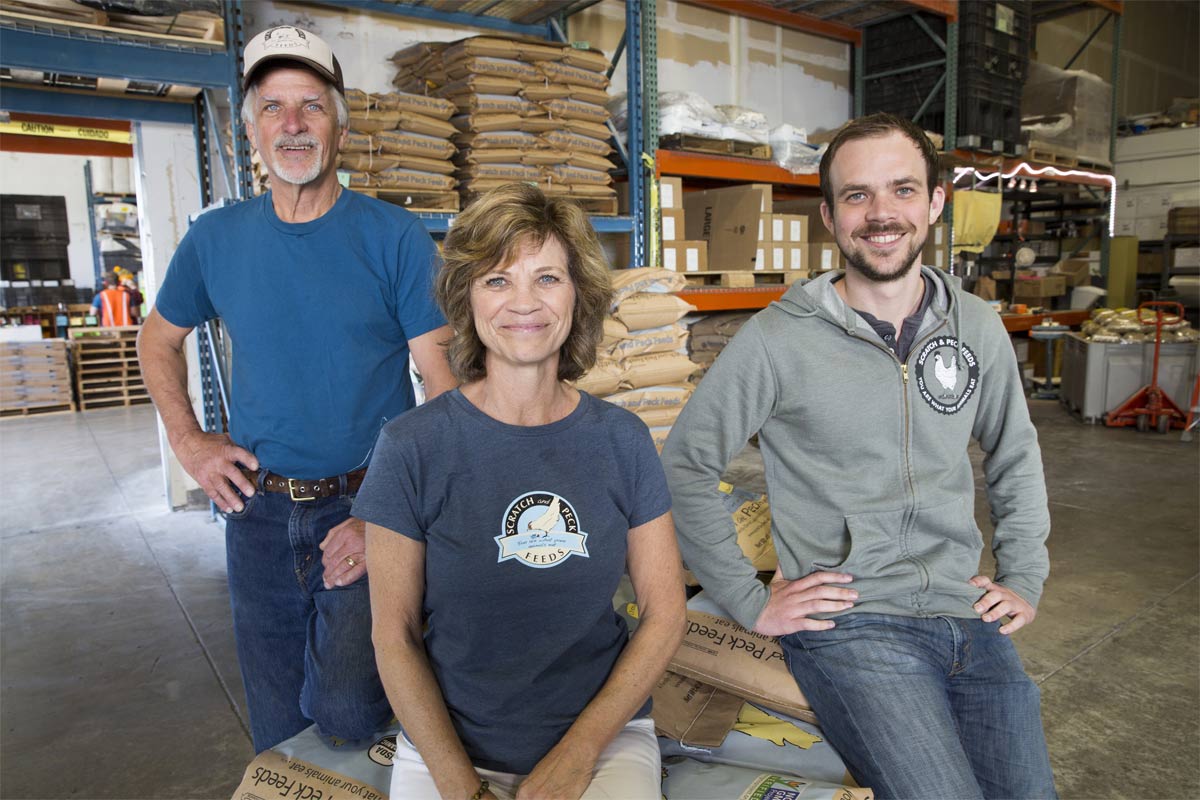As demand for organic meat products continues to grow, U.S. organic animal feed suppliers are increasing production capacity and opening new facilities to boost supply. Meanwhile, imports of organic corn and soybeans continue to flood the market, driving down grain prices for U.S. organic farmers.
Consumer awareness driving demand
Washington State-based Scratch and Peck Feeds recently expanded to a 40,000 square foot facility that will triple production—from 35 tons of feed daily to about 105 tons.
“Our new facility has grain silos and all new state of the art equipment—all made in the U.S. We are reducing our turnaround times and wanting to improve on that,” says Diana Ambauen-Meade, founder and owner of Scratch and Peck Feeds, which recently achieved B Corporation Certification.
Scratch and Peck supplies feed primarily to backyard urban and small production poultry farmers in California, Oregon, and Washington.
The company’s feeds are made from grains such as wheat, barley, oats, and corn, as well as peas, flax, sesame meal and fish meal for protein. No soy is used. Feeds are minimally processed.
Ambauen-Meade says demand is strong. “It’s definitely growing at a steady pace and increasing over last year and the year before. Consumers want a closer connection to their food and to trust that it is healthy.”
Across the country in Virginia, New Country Organics has also expanded their business, purchasing an old feed mill in Lubbock, Texas last fall.
“It’s a good middle of the country location; we wanted to get closer to California,” says Kevin Fletcher, vice president of sales.
There are a lot of organic grains grown in west Texas, including wheat, barley, and milo as well as black-eyed peas, that New Country Organics can access as feed materials.
Fletcher also sees demand driven by consumer awareness. “People are having a greater understanding that they are what they eat,” he says.
Like Ambauen-Meade, Fletcher says organic chicken is driving the feed market.
In the Midwest, James Frantzen, owner of Iowa-based Riverside Feeds, has seen organic feed demand increase by double digits for the past four to five years, which led him to expand his production.
“We’re going to double in size with the tonnage of products that we offer pelleted and that does not include the customer pelleting,” Frantzen told FeedNavigator.com. “We’re going to include a lot more custom pelleted as long as it’s organic or at least non-GMO, so we’ll probably triple, if not more, the tonnage of overall materials running through the plant.”
Riverside’s feed is made from oat hulls, soybean hulls, or textured proteins, sourced from food-grade organic processing plants. A variety of Midwestern suppliers have ensured a steady supply of ingredients, which are made into pellets, primarily for feeding cattle.
Another Iowa-based feed manufacturer, Catalyst, recently received organic certification, becoming one of only a few in the Midwest offering premix and private label organic services.
Doubling down on domestically grown organic grain
In Vermont, F.W. Cobs Company is expanding its organic feed production to support U.S. and Canadian domestic production of organic grains. In the past two years, large volumes of corn and soybeans have been imported from countries such as Turkey, Ukraine, India, and China. While organic processors can use cheaper imported grains, the imports are hurting U.S. farmers. There are also questions about the organic integrity of the imports.
“Organic grain prices are close to an eight-year low, due to the flood of imported grain. The lower prices are hurting domestic producers and scaring potential new producers away from making the transition into organics,” says Shaun Brooks, F.W. Cobs’ president.
In a recent announcement, F.W. Cobs says it is “doubling down on domestically grown organic grain.” The company says it “has invested in additional storage capacity along with adding human resources to continue our focus on purchasing only domestically grown organic grain from the United States and Canada.”
F.W. Cobs says it plans to double its capacity for purchasing in the Midwest.
New Country Organics also buys only domestic organic grains. “We’re holding to our standards of buying U.S. grain, and supporting American organic grain farmers,” Fletcher says.
Meanwhile, larger organic feed suppliers, such as Nature’s Best and Purina, are using organic imports, according to Fletcher.
California-based Modesto Milling uses imported organic feed grains because their location near to West coast ports makes it convenient and less expensive.
“There is pressure on (feed) inputs that makes imports more popular. “There is always a margin squeezed between inputs and the price you sell products for,” says Chris Wagner, Modesto Milling sales and marketing representative.
GMO impact
Concerns around genetically modified foods are also impacting organic feeds. “A lot of people don’t want corn or soy to avoid any thought of GMO contamination,” Fletcher says.
Several feed manufacturers including Scratch and Peck, Modesto Milling, and Coyote Creek Farms have gotten their feed products Non-GMO Project Verified.
Scratch and Peck was the first feed company in North America to receive non-GMO verification.
“When I heard there was a non-GMO verification, I said ‘we’re doing that,’ ” says Ambauen-Meade. “It was about our passion, which remains a huge part of our ethos and is reflected in every decision we make.”









